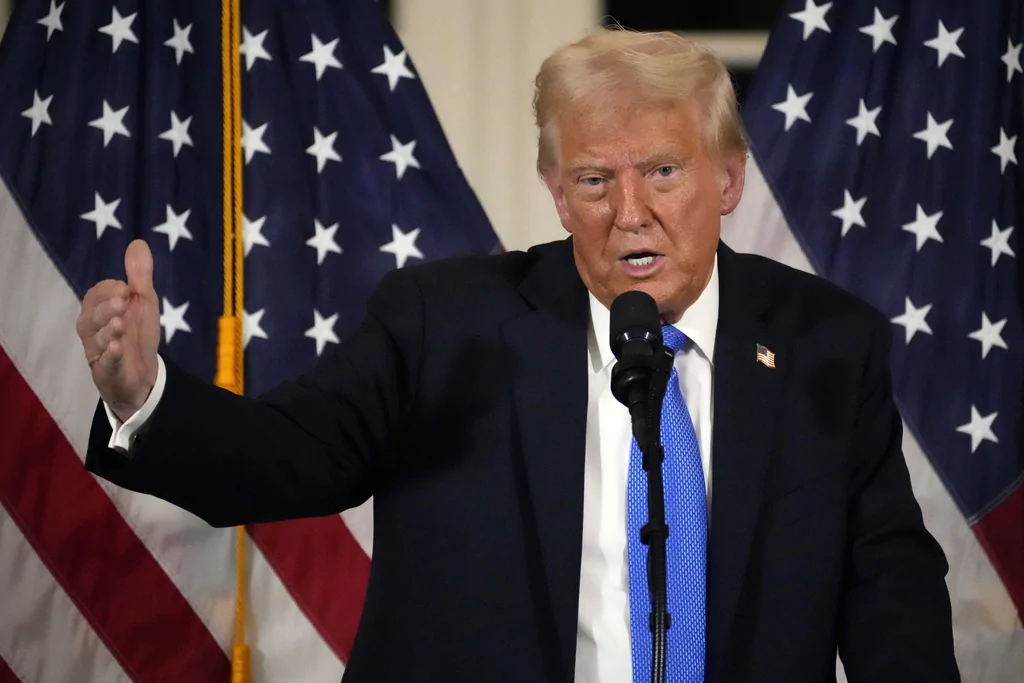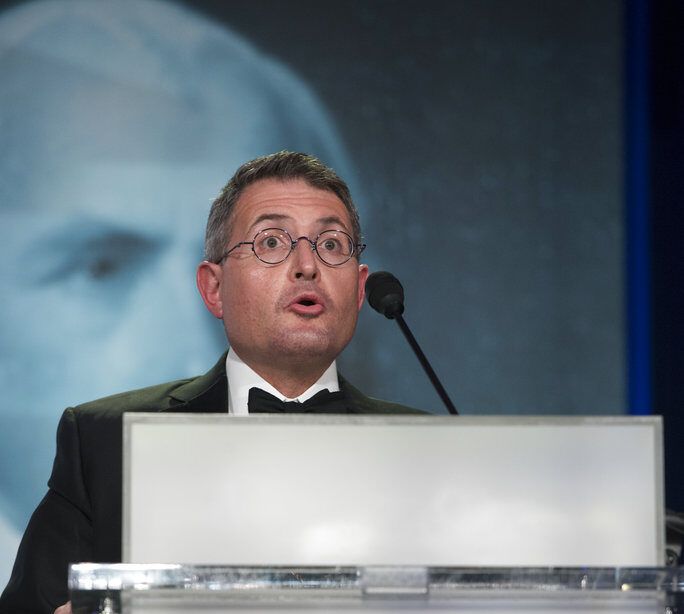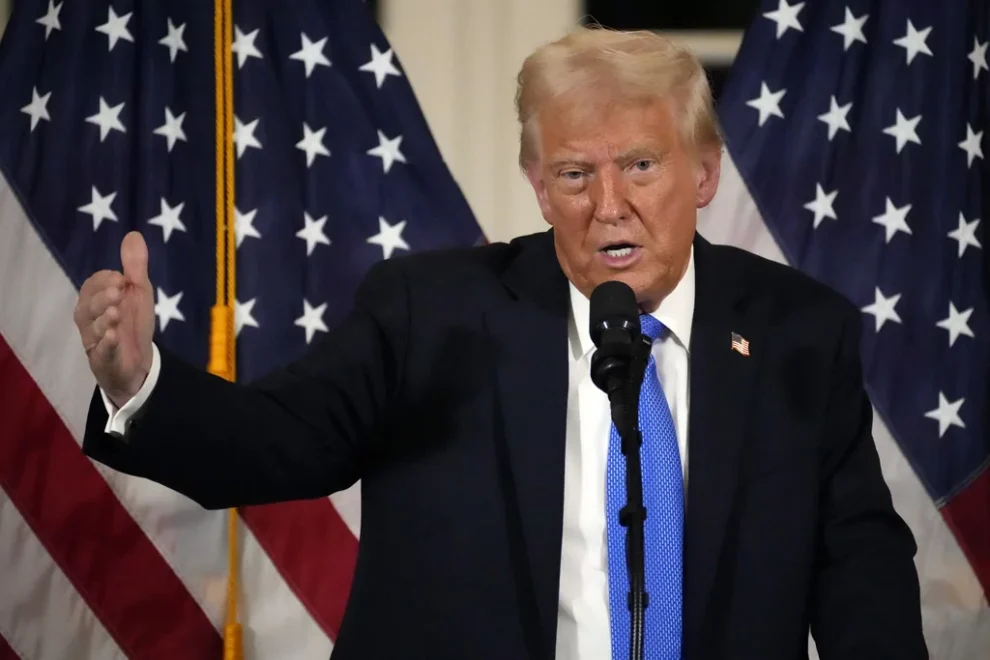Leonard Leo, the architect of President Donald Trump’s first-term legal legacy, is now at the center of a growing backlash from within Trump World — including from the president himself.
The attacks from Trump and his allies on Leo and the Federalist Society reflect rifts between the populist Right and the conservative legal establishment. They also underscore the high stakes of selecting judicial nominees during Trump’s final term in office.
Trump launched an unusually personal attack last week on Federalist Society’s co-chairman Leo, calling him a “sleazebag” and accusing the conservative legal network of giving him “bad advice” on judicial appointments. The comments, posted to Truth Social, came after the U.S. Court of International Trade ruled against Trump’s tariff policies — a decision that set off a wave of public recriminations among Trump-aligned conservatives.

“I was new to Washington, and it was suggested that I use The Federalist Society as a recommending source on Judges,” Trump wrote, referencing his reliance on then-Federalist Society Executive Vice President Leonard Leo’s advice. “I did so, openly and freely, but then realized that they were under the thumb of a real ‘sleazebag’ named Leonard Leo, a bad person who, in his own way, probably hates America, and obviously has his own separate ambitions.”
Notably, the Federalist Society takes no specific policy positions or makes endorsements of judicial nominees publicly, though many lawyers from the influential legal network have gone on to be appointed to lifetime roles on the federal judiciary, and oftentimes current judges moderate panels at the group’s events around the country.

Leo, whose claim to fame involved his recommendations to Trump to nominate Justices Neil Gorsuch, Brett Kavanaugh, and Amy Coney Barrett for lifetime Supreme Court seats, declined to escalate the dispute.
“I’m very grateful for President Trump transforming the Federal Courts, and it was a privilege being involved,” he said. “There’s more work to be done, for sure, but the Federal Judiciary is better than it’s ever been in modern history, and that will be President Trump’s most important legacy.”
A flawed attack fuels deeper resentment
Legal scholars and former Justice Department officials say Trump’s attacks on Leo and the Federalist Society stem from a deeper ideological divide on the Right.
Josh Blackman, a professor at South Texas College of Law and a frequent figure at Federalist Society events, said he believes the new judicial nominations fight will take place between two factions on the Right versus the standard debates between Democrats and Republicans.
“In the past, the most vigorous clashes over judges happened between the left and the right. I think the next round of wars will be on the right,” he wrote for Volokh Conspiracy. “The left can sit back and enjoy the fireworks.”
Trump’s recent broadside against Leo was sparked by a ruling from the U.S. Court of International Trade that blocked his reciprocal tariff policy. That ruling has since been temporarily reversed by an appeals court.
Despite Trump’s post last week, marking the harshest-worded attack on Leo since the pair’s reported falling out in early 2024, the irony, according to some observers, is that Leo most likely had no involvement in the selection of the judge that ruled against his tariffs, nor would it have mattered.
As multiple legal analysts have pointed out, Judge Timothy Reif, the Trump-appointed member of the three-judge panel, was not a Leo pick. Reif was nominated as part of the court’s bipartisan requirement and was recommended to Trump by then–U.S. Trade Representative Robert Lighthizer, a former Democratic counsel for the House Ways and Means Committee.
“There’s probably little or no legitimate reason for Donald Trump to blame Leonard Leo for Judge Reif and the loss in the tariffs case,” analyst David Lat wrote. “Even if Reif had voted the other way, Trump still would have lost, 2–1.”
While many of the details and context surrounding Trump and Leo’s feud have not been publicly detailed, the public criticism the president has leveled at his former adviser stems from complaints about the way Trump’s nominees have handled certain cases surrounding his executive actions.
Earlier this year, Trump-appointed U.S. District Judge Fernando Rodriguez found that Trump’s invocation of the Alien Enemies Act to deport Venezuelans was unlawful. Weeks later, a separate Trump-appointed judge found the statute was lawfully invoked, ruling Trump met the requirements to say there is an “invasion” or “predatory incursion” on the United States.
Jack Goldsmith, former assistant attorney general under former President George W. Bush and now a professor at Harvard Law School, argued that Trump’s frustration dates back even further, to his first term.
“The president was very frustrated … by lawyers inside the administration who were telling him he couldn’t do certain things,” Goldsmith told former President Barack Obama’s counsel Bob Bauer during a video conversation for their newsletter, Executive Functions. “He was extremely disappointed when the federal judiciary, including many judges he appointed … didn’t go along with his election claims for the 2020 election.”
Since then, Trump and his allies have questioned not just the judges, but the legal philosophy that guided many of their appointments, Goldsmith argued.
“There’s a genuine debate in the legal academy, within the conservative movement … about whether originalism is the right approach,” Goldsmith said. “What’s different about Trump 2.0 criticisms is it’s far to the right of the traditional conservative legal movement and its commitment to originalism and textualism,” he said, contrasting Trump’s views with those of conservative judicial advocates such as the late Justice Antonin Scalia or former Senate Majority Leader Mitch McConnell.
Now, “it’s grounded in a vision of what the proper outcomes in the federal judiciary are,” Goldsmith said.
Not everyone agrees with Goldsmith’s diagnosis, however. Robert Luther III, a professor at the Antonin Scalia Law School and former White House associate counsel who helped oversee judicial selection under Trump’s first-term, told the Washington Examiner last month that Trump’s handful of nominees have thus far not drifted far from what Leo aimed to accomplish with his guidance in the president’s first term.
“Nobody that actually knows what they’re talking about has ever taken the position that the judges are going to be materially different this time,” Luther said, noting Trump’s nomination of Tennessee Attorney General’s office lawyer Whitney Hermandorfer to the 4th Circuit “looks just like the kind of person we would have picked.”
“If the same people were there this time, we would have picked her,” Luther said, referring to Trump’s first-term advisers.
Backlash from longtime conservative allies
Trump’s escalating rhetoric, including calling Leo a “sleazebag” and saying the Federalist Society “gave me… bad advice” on judicial nominations, has drawn rebukes from figures who once praised his first-term court picks.
UC-Berkeley law professor John Yoo told the New York Times that Trump was “basically turning his back on one of his biggest achievements of his first term.” John Malcolm of the Heritage Foundation told Bloomberg Law the president was “needlessly offending an ally.”
Ed Whelan, a conservative legal commentator and frequent Trump critic, warned on X that Trump’s new approach might backfire. “Just yesterday, a very conservative appellate judge told me that s/he wouldn’t take senior status because of concerns over who would be picked as successor,” Whelan claimed.
Just yesterday, a very conservative appellate judge told me that s/he wouldn't take senior status because of concerns over who would be picked as successor. https://t.co/VrtS0TJgo8
— Ed Whelan (@EdWhelanEPPC) May 29, 2025
Whelan’s anecdote correlates with a theory posited in a recent academic study published last year, which found that judicial nominees’ ideologies influence retirement decisions for judges currently considering whether to end their life tenure on the federal bench.
“Why might this matter?” Case Western Reserve University law professor Jonathan Adler rhetorically asked in a blog post for the legal blog Volokh Conspiracy. “At this moment there are 22 circuit court judges who were appointed by Republican Presidents who are eligible for senior status but have not yet announced any intention to step down, as well as 42 district court judges.”
For Adler, this suggests that if the White House wants to make Trump’s nomination process as influential as last time, “it should seek to appoint the sort of judges that are likely to instill confidence in judges who are eligible to take senior status, particularly in the beginning.”
At the same time, voices aligned with Trump have gone on offense.
Mike Davis, founder of the Article III Project, accused Leo of building wealth for himself while refusing to help Trump during the years he faced prosecutions from Democratic district attorneys and federal prosecutors.
“Leonard sat on the sidelines with all that money for three years of lawfare and didn’t support groups that were helping President Trump,” Davis said on Steve Bannon’s War Room Friday.
“You would think that after you’ve gotten very wealthy off of President Trump, you could at least give President Trump the loyalty of keeping your mouth shut,” Davis added.
Trump’s new team, new strategy
With Leo sidelined, Trump’s judicial nominations are now being shaped by a tighter circle of aides and outside activists. Inside the White House, that includes chief of staff Susie Wiles, counsel Dave Warrington, and deputy counsel Steve Kenny.
Outside, Davis’s Article III Project is gaining influence, including in the recommendation of nominees like Hermandorfer, who clerked for Justices Samuel Alito and Barrett and was confirmed as Trump’s first appellate nominee of the term.
Goldsmith pointed to the nomination of Emil Bove, a former Trump personal lawyer and current Principal Deputy Attorney General, to the Third Circuit as emblematic of the shift.
“[Bove] has proven himself … as starting with representing Trump … and certainly with his actions in the Justice Department, he has proven himself to be a thoroughly credible loyalist,” Goldsmith said. “This is someone with a track record of complete loyalty to the President and in executing the President’s will.”
However, the Senate’s treatment of Bove’s nomination “is going to be a real moment to see whether Trump is going to be able to change the composition of the federal judiciary the way he wants,” Goldsmith added.
A NEW TEAM GUIDES TRUMP 2.0 AS HE BEGINS TO FILL JUDICIAL VACANCIES
While many see stark differences between Trump’s first and second term judicial selections, Trump’s first-term defenders, such as Luther, say that the jurisprudence and ideology of nominees such as Bove and some of Trump’s most recognizable first-term picks go hand in hand.
“Even before President Trump was re-elected I said that this term candidates for the most coveted judgeships will likely need to have demonstrated some form of public support for the President or his policies,” Luther told the Washington Examiner last week, noting “there is nothing wrong with that,” and that judicial nominees throughout history have more frequently shared “some connection” to the presidents that nominate them.
























